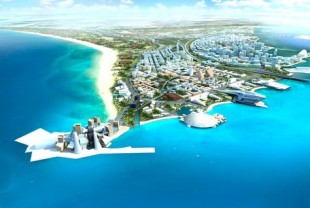

Abu Dhabi tourism developer mulls asset sales

Abu Dhabi's government-owned Tourism Development Investment Company (TDIC), builder of branches of the Louvre and Guggenheim museums, is mulling asset sales to help repay $2 billion in debt maturing in 2014, its chief financial officer said.
Shaun O'Connor said the developer had been in talks with Gulf region investors on the sales and was considering whether "to pay off or to extend" the bonds.
"We have assets on the market today to sell ... into private hands and spur investment in Abu Dhabi," he said in an interview at TDIC's headquarters on the outskirts of Abu Dhabi.
"Around six buildings, we're talking about taking to the market on a sales strategy because there's an appetite for the product. I'd like to see someone come in with a large hotel fund and buy some hotels."
The assets include hotels and apartments on Abu Dhabi's Saadiyat island and the Eastern Mangroves area. A few deals could be finalized before the end of the first half of this year, he said, adding that Gulf investors are coming to diversify their portfolio.
"The proceeds ... half for bonds and debt payment and half to invest in my business. We are trying to manage the liability side of the company aggressively but appropriately to make sure that we are also investing for the future of TDIC," he said.
TDIC, which has struggled amid a regional property slump, has a $1bn Islamic bond and $1bn conventional bond falling due in 2014. At the end of 2011, it had AED13bn ($3.54bn) in debt outstanding and 2 billion dirhams in cash.
The firm's total assets stood at around AED14.5bn at the end of 2011 and include at least 10 operational hotels and resorts including The St. Regis Saadiyat Island resort. It also owns several retail and residential apartments.
O'Connor said the developer needs between AED1-2bn in capital expenditure over the next five years, much of which will come from bank debt, capital markets and equity.
In a first for the developer, it drew $150m in private equity to help fund projects, comprised of $100m for a $150m retail-based project around the Louvre museum and commitments for another $50m for a mixed infrastructure project.
"We are testing the market to understand: have we done enough to build projects that make sense for third party equity investors?" he said.
TDIC, which shelved plans for a bond last summer after a roadshow, may tap debt markets as part of its strategy to have a capital with 50 percent debt, O'Connor said.
"If capital markets are liquid and plain nice to issuers we may go out to the market. It is still early," he said.
TDIC, which had an operating loss of between AED150-200m before EBIDTA in 2010, could double losses in 2011, he said.
"If I have to project that, in the worse case ... double that (of 2010)," he said, adding the firm would be EBIDTA positive before the originally projected year of 2016.
Across the oil-rich emirate, which accounts for more than half of the UAE's economy, government-backed real estate, commercial and tourism projects, many conceived during the boom years of 2003-2008, are under review and in some cases being delayed or put on hold.
Abu Dhabi pushed back the opening of the much talked about local branches of Louvre and Guggenheim art museums earlier last month.
TDIC will re-tender for the Louvre project in the first quarter of 2012, O'Connor said. The museum projects, which will be fully funded by the Abu Dhabi government, are now slated for completion two to five years behind their original schedule.
"The government pays for the project and we transfer ownership back to the government," he said.
Other planned museums such as the Performing Arts Centre and Maritime Museum are not cancelled but postponed, "at least not for another five years, he said.
"They are not shut down, just on hold."